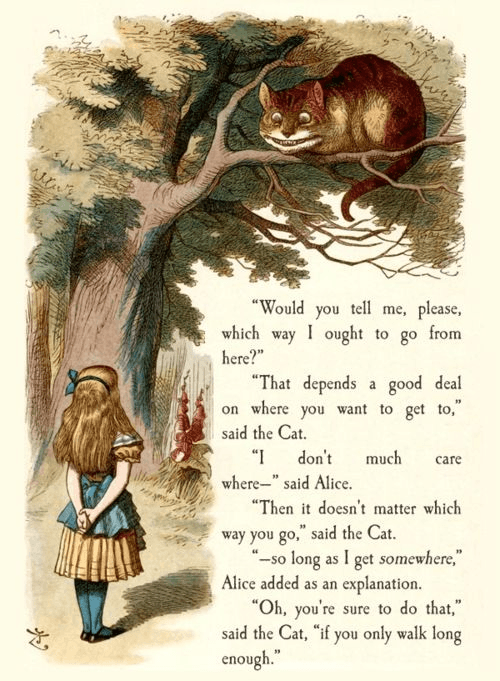🧵 View Thread
🧵 Thread (33 tweets)

I finished undergrad at a fancy STEM school this past May. I switched my major 3.5 times in 4 years, going from mechanical engineering, to electrical computer engineering, to a self defined major, to philosophy this story's about not knowing what you want; my domain of expertise

I was obsessed with this quote at the end of highschool Of Course! No decisions matter unless you Know What You Want! i reflected endlessly on what I wanted, how to best craft my goals, and making sure I was always acting of my own volition, never just "going with the flow" https://t.co/w45hcyTnHU


I still think that understanding what you want is of utmost importance, but I relate to the idea incredibly differently from how I used to I thought "knowing what you wanted" looked like having A Mission. All the cool kids had A Mission, and I wanted one sooo bad

I also bought into the very pervasive frame that "doing what you really want" was mostly about getting rid of forces that are trying to pull you in other directions. You needed to Stop Caring What Others Think and Just Be You. there is a "true you", it just needs liberation

through a long Series of Interesting Events i've come think less in terms of "figuring out what I want" and more in terms of "cultivating taste" it's a frame shift that uses a different metaphor to add important details that I didn't appreciate for many years

The ability to want/value/care/like is an ability that needs to be practiced and developed. I think of Taste as developing a sensitivity to your own experience of the world. A literal sense organ that thru attention and practice you can increase the resolution of

@voyageur_techno asked me "what's the difference between taste and elitism?" They way a lot of people talk about taste *is* just elitism. These are the GOOD things, you're not allowed in unless you like them. I focus on Taste as sensitivity, not just as a thumbs up or down

I claim that elitism and prestige are the natural attractors you'll fall into if you don't cultivate taste. Imagine a culinary school that teaches students the foundations of cooking and all The Classic Recipes, but never lets them taste the food they make.

All their work is graded by judges with "good taste". These students will learn to cook "good food" or drop out You graduate from this school top of your class and are given your own restaurant. Finally, freedom! You can cook anything! No constraints! Except...

food means nothing to you EXCEPT thru how it has been judged by the school. You don't know what it tastes like for a dish to be savory. You don't know what it tastes like to be over seasoned. As importantly, you don't know what YOU think tastes good

If you let your sense of taste atrophy, it won't be high resolution enough to guide you through the complexities of life. And you'll fall back on what you've practiced, on what you know "works". Cooking something that scores points

In university, the flavor of prestige in the air that I got lead by was rigor. Do all the hard classes. Pick fights with scary classes with big reputations. It's really bad at my Uni. Kids will routinely pull all nighters to tackle to be lauded as "gods" for working so hard

Tests are the main force I see opposing Taste. I see both the elitism of liking the right things, and actual Uni exams as both being Tests. The defining feature is having a legible scoring system that tells you *exactly* how well you are doing

I'm not a Test abolitionist. That's a way broader and more tricky topic. I want to demonstrate how pressure to Ace Tests pushes you to sensitize to the value system of the test instead of sensitizing to your own experience (aka, developing taste)

The more pressure, the more you look for certainty. If your taste is in early stages of development, it doesn't give a lot of certainty. But Tests offer certainty. All the have to do is get A Good Score and then You Pass! So simple! So easy!

A paradox that has haunted me, from absorbing some advice: 1). It'll never happen unless you have a concrete plan with concrete goals. Get to work! 2). The most important things are stuff like love/happiness/meaning 3). The above are nebulous and can't be made into a checklist

There are narratives that want to tell you that Test like things, legible things, are the only things you can trust. You cant have an ambiguous goal! How would you know if you achieved it?! Taste can be "ambiguous", but that doesnt mean it cant provide clarity and conviction

The "ambiguity" that Tests decry is more about Legibility: can a bunch of people easily agree on it? You can get everyone to agree that you've got a 4.0 GPA. You can't get everyone to agree that your thesis displays creative intelligence.

So far, the only criticism I've had of Tests is that people are pressured to sensitive to Tests instead of to themselves. Equally scary is the consistent pressure to accept Tests as real, meaningful, and objective reflection of [thing being tested]

Historically, most Tests came about to create a gate to some resources. Typically, the closer the resource is to something we think everyone "deserves" the more pressure there is for the grading process (not just the score) to be a Legible process

Tests not only take attention away fro Taste, they try to assert themselves as all that is. It's the logic of Tests that says anything besides "unambiguous concrete goals" is fake. Not only are Tests not *your* value system, they are more impoverished than any real value system